 |
|
 |
|
| About Us | Essential
Library |
Homepage Archive | Resources | Composer Links |
by
Jerry Bowles

|
THE POWERHOUSE FINNS: What is it about Finland, these days? "Half a century after the death of Jean Sibelius, his tiny Nordic homeland has emerged as a musical superpower of the new millennium. A fierce national commitment to musical culture has made the Finnish scene the envy and the talent reservoir of countries throughout Europe and North America." The Globe & Mail (Canada) 02/02/02 REINVENTING ST. PAUL: The St. Paul Chamber Orchestra, which bills itself as "America's Chamber Orchestra," is reinventing itself, making changes in its home concert hall, and planning more tours to large cities. The goal? To be "the beacon for cultural excellence" in the Twin Cities. "Thirty years from now, when people talk about Twin Cities arts groups, we’d like the first thing off their tongues to be the St. Paul Chamber Orchestra. It’s no different than what the arch did for the city of St. Louis." St. Paul Pioneer Press 01/31/02 L.A. OPERA LIGHTLY TAPS THE BRAKES: Los Angeles Opera has been ambitiously scaling up its productions, and the company has announced numerous new initiatives and plans in the past few years. Now, with the announcement of next year's season, some of those plans have been scaled back as part of the artsworld's generally sobering reassessment of risks. Los Angeles Times 01/30/02 DOTCOM MUSIC MELTDOWN SPURS BBC: Online e-music ventures have poured millions of dollars into trying to create viable businesses. But GMN.com one of the most established, shut down last week, out of money, and its owners are looking for a buyer. Interestingly, as the dotcom meltdown continues, the BBC has rediscovered a commitment to broadcasting culture. It's about time, writes Norman Lebrecht. The Telegraph (UK) 01/31/02 AND YOU THOUGHT THIS STUFF ONLY HAPPENED IN ALABAMA: The Catholic hierarchy in Naples, Italy is taking a cursory shot at the city's leftist government, denying permits for the use of several of Naples's historic churches for concerts. Among the well-regarded guest musicians who may be left out in the cold is La Scala director Riccardo Muti. The local monsignor is questioning "whether performing artists should be chosen "mainly for their showmanship and social acceptance rather than for their personal commitment in bearing witness to the values of the Gospel." Andante 01/28/02 THE ONLINE ORCHESTRA: "All the evidence, anecdotal and otherwise, suggests that the virtual box office is changing the way orchestras do business." American orchestras are selling more and more of their tickets online - the Chicago Symphony, for one, has seen e-sales double or triple each year in the past four seasons. Andante 01/27/02 REPORTS OF MY DEATH... So some orchestras are struggling in the business of survival of late. And some may even go out of business. But the orchestra is hardly dying as an institution, writes David Patrick Stearns. There is too much evidence to the contrary. Besides, "those orchestras will survive, because the public, more unconsciously than consciously, knows that when its opera company and symphony orchestra go away, the only thing left in many cities will be congested strip roads, plastic burger signs, abandoned bowling alleys and cable TV." Andante 01/27/02 PARALYSIS CAN'T DERAIL CONDUCTOR: Mario Miragliotta was a promising conductor who had recently finished his term as music director of the Santa Barbara Symphony and had been appointed assistant conductor of the Los Angeles Chamber Orchestra, when he got into a car accident last June that left him paralysed, unable to move his hands or legs. Determined to overcome the injuries, he's been working daily to get back on the podium, and he's got a concert coming up... Los Angeles Daily News 01/28/02 THE ALTERNATIVE MUSIC: Miami-area classical music fans were upset when WTMI, the area's only classical music station, changed its format to dance music in January. Now the University of Miami college radio station is taking up some of the slack by programming classical. Miami Herald 01/31/02
|
Electronic Dialogues An Interview with Steven R. Gerber
Gerber has written for many of the major performers of our time. In addition to the concertos written for Nikkanen and Brey, he wrote his String Quartet #4 for the Fine Arts Quartet, his Viola Concerto for Yuri Bashmet, who premiered it at his festival in Tours, and several works for Russian violinist Tatyana Grindenko. His works have also been performed by such groups as the Knoxville Chamber Orchestra under Kirk Trevor, Philharmonia Virtuosi under Richard Kapp, and The Russian National Orchestra under Mikhail Pletnev. Most recently, he received a commission from Concertante Chamber Players for a work entitled "Spirituals" for clarinet and string quartet, premiered by them in 2001 in Harrisburg, New York City, and the Library of Congress in Washington, D.C.
Born in Washington, D.C. in 1948, Gerber now lives in New York City.
He has degrees from Haverford College and from Princeton University, which
awarded him a 4-year fellowship for graduate studies. His works have
been played throughout the U.S., Europe, and the former Soviet Union, where
he has toured frequently and had literally dozens of orchestral performances
and
S21: You are a remarkably prolific composer and have created works in a wide variety of forms—orchestral, chamber, choral, solo. Do you prefer one form over another? SRG:
For a long time I preferred to write solo, vocal, or chamber works
and didn't expect to write much for orchestra. When I began my Symphony
in 1988, at the age of 40, I had written only one previous work for orchestra,
some settings of Wallace Stevens for soprano and orchestra, which were
still unplayed. (I had to wait nearly 15 years for them to be performed;
oddly enough they were given two performances in Ukraine during the same
year with two different orchestras, singers, and conductors.) I Had
no idea when I would hear the Symphony, or my next work, a Serenade for
Strings, but I got
The Adams Chronicles
|
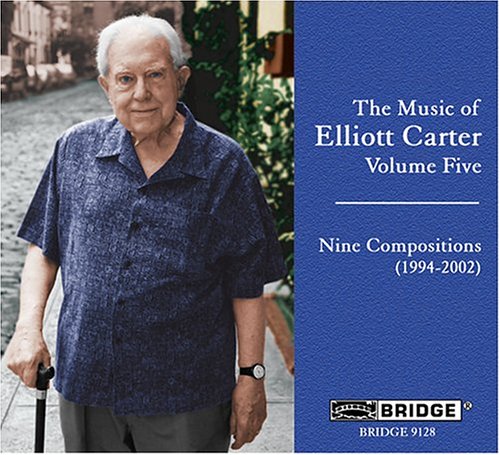
The Music of Elliott Carter, Volume Four Composer: E. Carter Conductor: Elliott Carter Performer: Susan Narucki, David Starobin, et al. Ensemble: Daniel Druckman Bridge - #9111 Volume four of Bridge's comprehensive Elliott Carter series includes the masterpiece, Eight Pieces for Four Timpani, as well as a number of short recent works. Particularly fine is David Starobin's performance of "Shard," a piece for solo guitar that is short but breathtakingly original. |
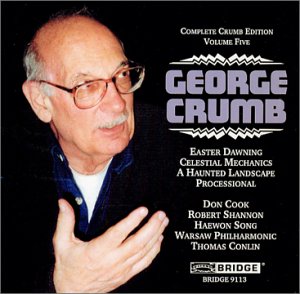
Complete Crumb Edition, Volume 5: Easter Dawning, Celestial Mechanics, A Haunted Landscape, Processional Composer: George Crumb Conductor: George Crumb Performer: Thomas Conlin Ensemble: Haewon Song , Robert Shannon Don Cook Bridge - #9113 The fifth release in Bridge's award winning Complete Crumb Edition includes the premiere recording of Crumb's1992 carillon solo, "Easter Dawning" played by Don Cook, carilloneur at Brigham Young University."Celestial Mechanics", for piano, four-hands is pure Crumb. "A Haunted Landscape" 1984) for orchestra is played by The Warsaw Philharmonic under conductor Thomas Conlin, the same combination that produced the Grammy-winning "Star-Child". |
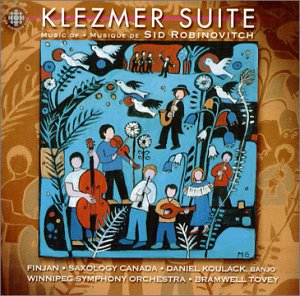
Klezmer Suite Composer: Sid Robinovitch Cbc Records --Naxos-- - #5212 |
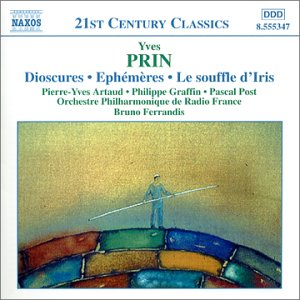
Dioscures, Ephemeres Composer: Yves Prin Conductor: Bruno Ferrandis Performer: Pierre-Yves Artaud Ensemble: Orchestre Philharmonique de Radio France Naxos - #8555347 Once you know that Prin was in Boulez's first composition class at IRCAM, the fact that all of these pieces are revisions of earlier pieces begin to make sense. Like the master, Prin is obviously a harsh critic of his own work. At 41 minutes, the disk covers a lot of contemporary territory and contains flashes of geninue originality. |
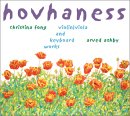
Violin|Viola and Keyboard Works Composer: Alan Hovhaness Performers: Christina Fong, Arved Ashby This disc might easily be subtitled "music to chill out by." Deceptively simple and meditative with just the right touches of exotic eastern mysticism, this is music that captivates through simplicity. A keeper. |
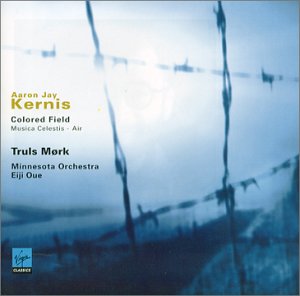
Colored Field · Musica Celestis · Air Composer: Aaron Jay Kernis Conductor: Eiji Oue Performer: Truls Mørk Emd/Virgin Classics - #45464 Some of Kernis' greatest hits retooled for Truls, who performs them magnificently.
|
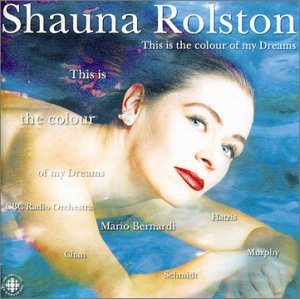
This Is the Colour of My Dreams Conductor: Mario Bernardi Performer: Shauna Rolston Ensemble: CBC Radio Orchestra Cbc Records --Naxos-- - #5214 Ralson is an enthusiastic advocate and performer of contemporary music. She has given the North American premiere of Gavin Bryar’s concerto, "Farewell to Philosophy", Rolf Wallin’s "Ground" for solo cello and strings, Krzysztof Penderecki’s Sextet for violin, viola, cello, piano, clarinet and horn, as well as the Canadian premiere of "Kai", a work for solo cello and 18 instruments by Mark Anthony Turnage. Here she delivers the world premieres of works written especially for her by Canadian composers Heather Schmidt, Christos Hatzis, Chan Ka Nin, and Kelly-Marie Murphy. |

Selected Songs Composer: Ned Rorem Performer: Ned Rorem, Carole Farley Naxos - #8559084 Pushing 80, Rorem continues to add to his extensive catalogue of over four hundred songs. His individual settings and cycles draw their texts from a wide range of poetry. Among his favorites sources have been Walt Whitman, Theodore Roethke, Kenneth Koch, Paul Goodman, and the English Metaphysical Poets. Nobody does art songs better. |
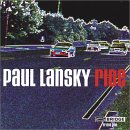
Ride Composer: Paul Lansky Bridge The title track, 'Ride', is a 19 minute piece made from sounds of a highway, processed and filtered to create sweeping sonic landscapes. An 8 channel version of the piece was played at Lincoln Center's 'Great Day in New York' festival in January 2000. |
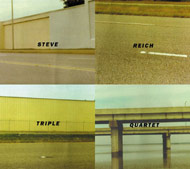
Triple Quartet/Music for a Large Ensemble/Electric Guitar Phase Steve Reich, Kronos Quartet, conductor Alan Pierson Wea/Atlantic/Nonesuch - #79546 This is the first recording of Reich’s Triple Quartet performed by Kronos Quartet, who commissioned the work and in whose honor it was written. This disc, the first to include a new work by Reich since the 1996 release City Life, also features first recordings of Electric Guitar Phase and Tokyo/Vermont Counterpoint, as well as the first recording of a newly revised edition of Music for Large Ensemble. |
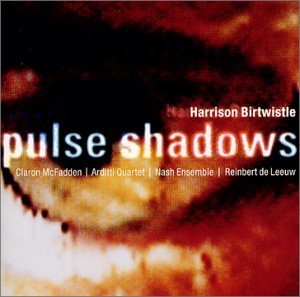
Pulse Shadows Composer: Harrison Birtwistle Wea/Atlantic/Teldec - #26867 Written for soprano, string quartet & ensemble of 2 clarinets, viola, cello and double bass, Pulse Shadows' nine string quartet movements alternate with the 'song' ensemble. The nine quartet movements comprise five Fantazias and four 'Friezes', of which the fourth is an instrumental meditation on Celan's famous poem Todesfuge (Death Fugue), with its strange recurrent image of black milk. |

Brahms · Stravinsky - Violin Concertos Composer: Johannes Brahms, Igor Stravinsky Performer: Neville Marriner Sony Classics - #89649 Thank heaven for little girls. Kid breathes new life into old workhorses. |
|
One-Minute Web Guide The essential guide to intelligent life on the internet |
Publisher: Duane Harper Grant (212) 582-4153 Editor: Jerry Bowles (212) 582-3791 Contributing Editors: Armando Bayolo, Sam Bergman, Joshua Cohen, Karina Cristina Demitrio, Deborah Kravetz (C) Sequenza/21 LLC 2000 |